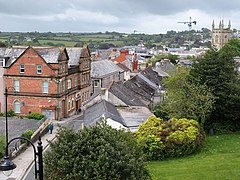St Austell
St Austell
|
|
|---|---|
 High Cross Street |
|
| St Austell shown within Cornwall | |
| Population | 19,958 at the 2011 Census |
| OS grid reference | SX011524 |
| Civil parish |
|
| Unitary authority | |
| Ceremonial county | |
| Region | |
| Country | England |
| Sovereign state | United Kingdom |
| Post town | ST. AUSTELL |
| Postcode district | PL25 |
| Dialling code | 01726 |
| Police | Devon and Cornwall |
| Fire | Cornwall |
| Ambulance | South Western |
| EU Parliament | South West England |
| UK Parliament | |
St Austell (/sᵻnt ˈɔːstəl/; Cornish: S. Austel) is a civil parish and major town in Cornwall, England, UK. It is situated on the south coast, approximately 10 miles (16 km) south of Bodmin and 30 miles (48 km) west of the border with Devon.
St Austell is one of the largest towns in Cornwall; in the 2011 Census, St Austell civil parish had a population of 19,958, with a total of 34,700 living in the wider area comprising several other civil parishes.
One of the earliest references to St Austell is in John Leland's Itinerary, where he says "At S. Austelles is nothing notable but the paroch chirch".
Not long after William Cookworthy discovered china clay at Tregonning hill in west Cornwall, the same mineral was found in greater quantity in Hensbarrow downs north of St Austell.Clay mining soon took over from tin and copper mining as the principal industry in the area, and this eventually contributed enormously to the growth of the town. The clay industry really only came into its own during the mid 19th to early 20th century, at a time when the falling prices of tin and other metals forced many mines to close down or convert to clay mining. The success and high profitability of the industry attracted many families whose breadwinner had been put out of work by the depression in the local metal mining industry, and increased the population of the town considerably. This meant that more shops and businesses took root, providing more jobs and improving trade. This, along with other factors, led to St Austell becoming one of the ten most important commercial centres of Cornwall.
...
Wikipedia

